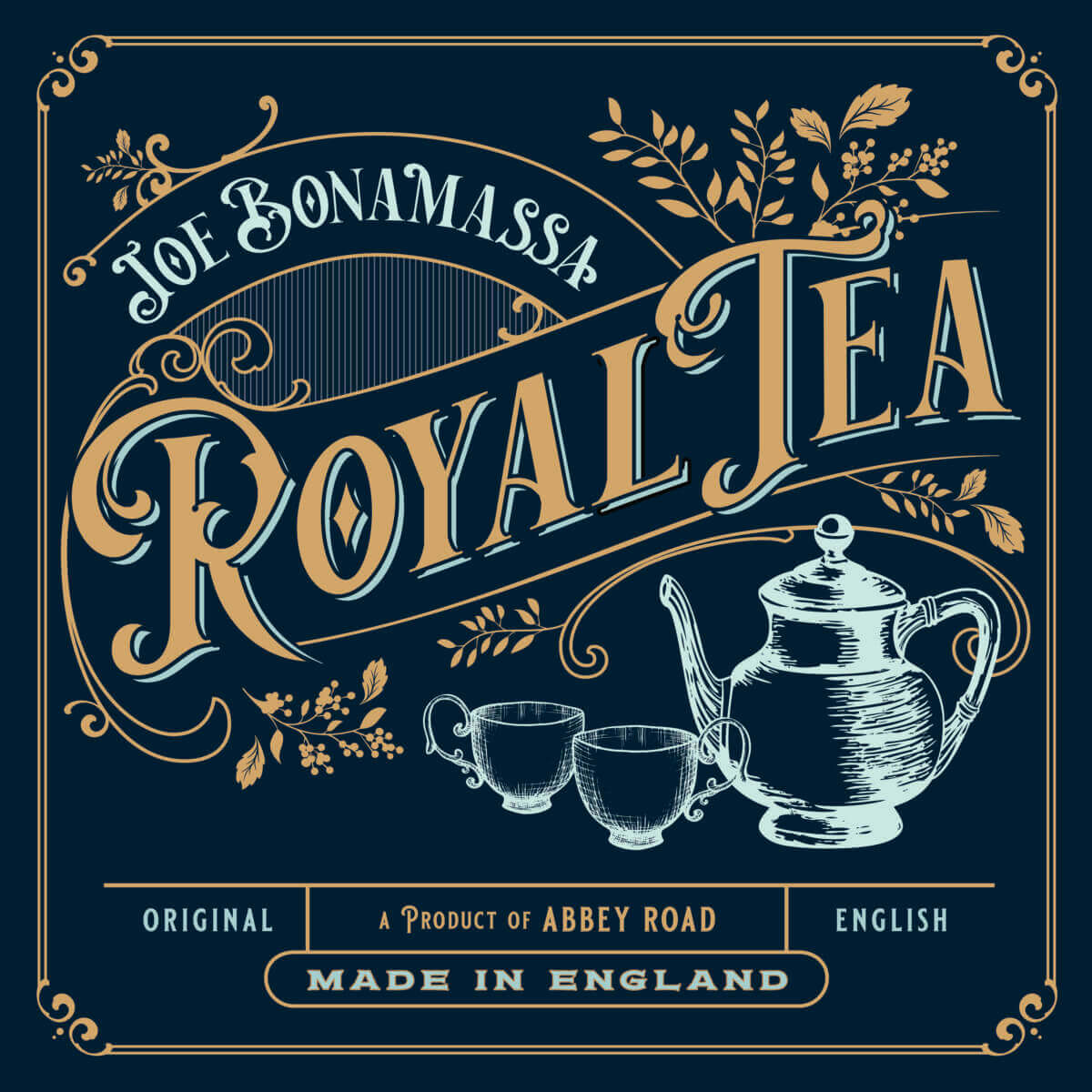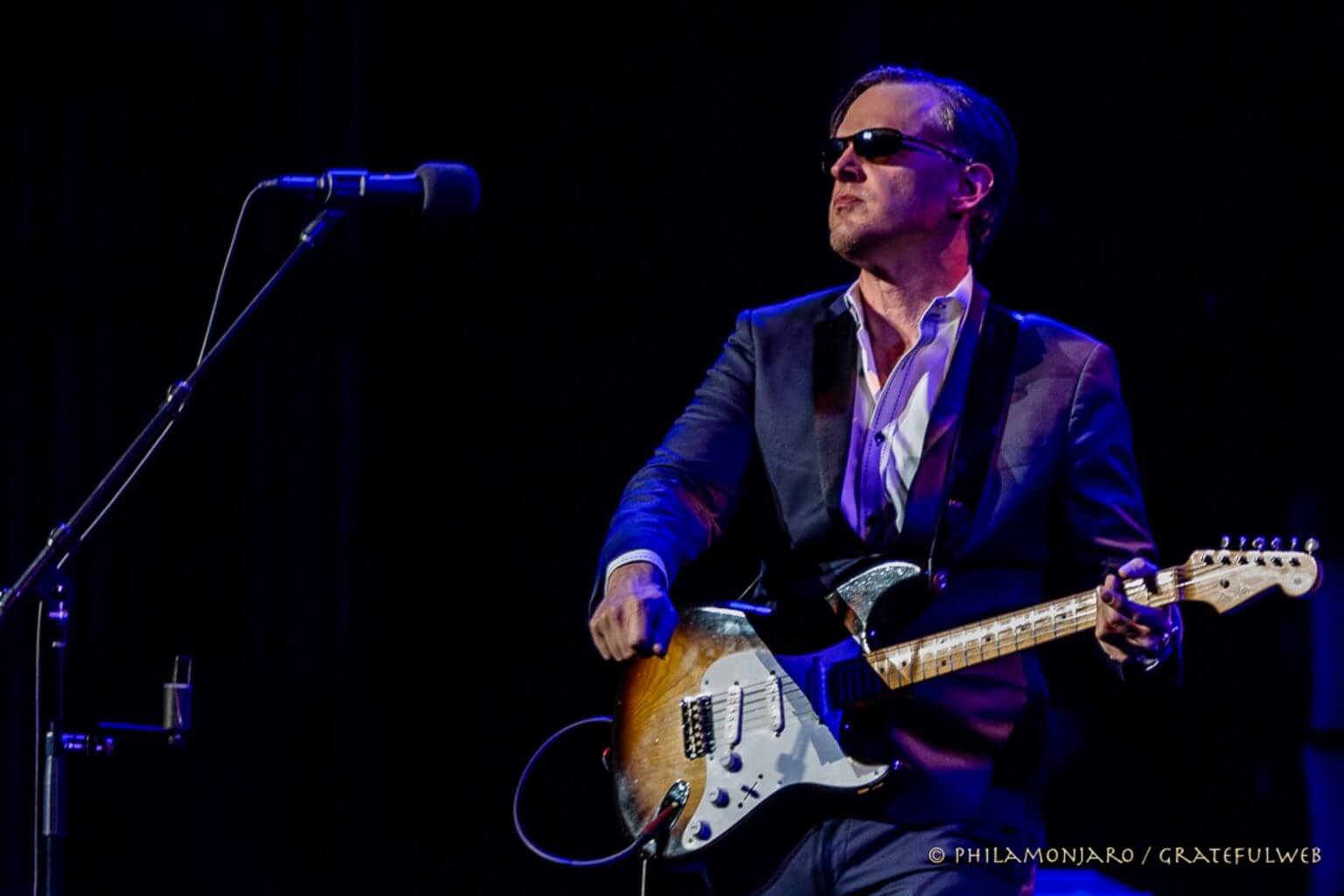Royal Tea is Joe Bonamassa‘s take on classic British blues rock albums, like Jeff Beck‘s Truth and John Mayall’s Beano, but with his own songs. The album is available today online and in stores from his own label, J&R Adventures.
Written with ex-Cream lyricist Pete Brown and a band featuring former Whitesnake guitarist Bernie Marsden, pianist Jools Holland and Bonamassa’s touring band (Anton Fig on drums, Michael Rhodes on bass and Reese Wynans on keyboards), it’s an old-fashioned album written for and in contemporary times, not covers but more historical reenactments. Bonamassa is reaching back to his influences, but, as he does with everything, is doing it on his own terms.

On working with Pete Brown, Bonamassa shares:
He’s got a lot of great stories about everyone. I’ve known Pete for 10 years or more. The thing about Pete is he is wonderfully eclectic. And he is that guy that’s still en vogue, still hip, and still got such a way with words. Like there’s a line in one of the songs, ‘I had no vision of nuclear fission,’ right?
And if I were in a Nashville writing group and I pitched those lines to a bunch of songwriters trying to write songs for bro country, I’d be kicked out of the room. Pete can pull it off because he means it and it makes sense. And I spoke to him yesterday and he’s still writing: ‘Yeah, I’ve got some cool ones for the next one, mate’.
What’s the process? Does he just send you lyrics indicating what’s a chorus and what’s a verse?
There’s no music. That was up to me and Bernie Marsden. When he sent us “I Didn’t Think She Would Do It,” we got British. Like Cream meets Iron Maiden meets Hendrix, you know? We just kind of sat there for about 15-20 minutes. All of a sudden there’s a verse. There’s your chorus. And it was so fun to write to that.
I’d send him the demo and he’d say, ‘I don’t know how to download it.’ I’m like, ‘Of course you didn’t.’ But lucky are the few, in this lifetime, who get to work with your heroes. Pete Brown, to me, he’s the fourth member of Cream, for sure. They talk about Billy Preston being the fifth Beatle. There’s probably five members of Cream: Felix Pappalardi, Pete, Ginger, Jack, Eric. To me, without those five people, Cream would not be. It’s a different band.
And you’ve talked about hearing the British blues when you were 12 and connecting to the sound instantly. Why do you think that’s such a common experience? What is it about the British blues that really grabs people?
I like British blues because it’s equally naive and equally selfish, all at the same time. British blues bands were listening to records and they thought Howlin’ Wolf was a huge guy. They thought he was Elvis, right? They never thought these guys were playing clubs. They thought they were big stars. They were naive to the fact that Americans didn’t appreciate their own. We’re talking about Shakespeare level artistic accomplishments. Muddy. Howlin Wolf. Buddy. Bobby Rush. All the masters. They romanticized these almost mythical heroes because they never thought they would meet them. And so it was a little naive.
And then they were selfishly trying to get themselves out of post-war Britain, meaning they wanted to go to California and chase girls, like the Rolling Stones. You know, get that energy, that spark. Also the competitiveness of the scene; everybody’s rolling around in London. Alexis Korner. John Mayall. Peter Green. I mean, everybody was there. Even Hendrix was there. And I always count Hendrix as an English blues man because he had an English blues band. And he made his reputation in London competing with the Who and Cream and the Stones. So it was all part of this scene. And it exploded, and then it got re-imported to America. And a lot of them achieved what they set out to do. They came to California to chase girls. And that’s what I hear when I listen to British blues. Danger. It is ramshackle, but it’s brilliant.
Do you remember what the album was that transformed you, or is it lost to time?
Jeff Beck’s ‘Truth.’ I listened to ‘Truth’ and I was like, ‘This is what I want to be involved in.’ And then I heard Mayall’s ‘Beano’ record and then after that, I heard Mayall’s ‘A Hard Road’ with Peter Green. And that version of “So Many Roads” that Peter played on and John sang just floored me, you know? I liked Otis Rush’s voice a little bit better, but John’s is just unique-sounding to me. And I liked Peter Green’s guitar tone better. And I liked his approach.
The blues is such interpretive music. The masters would do the same song, and do it in a different way. You know, Howlin’s take on it. Muddy’s take. Buddy Guy’s take on it. And it was all, is all designed for the live show. It’s all designed to get people up and dancing, so they can get paid. You get people going. I love that. There was no Instagram. There was no social media. There was no nothing. It was music as the purest form of entertainment. And that’s what they were. They were characters. They were entertainers.
Order Royal Tea
*Feature image credit: Phil Solomonson


